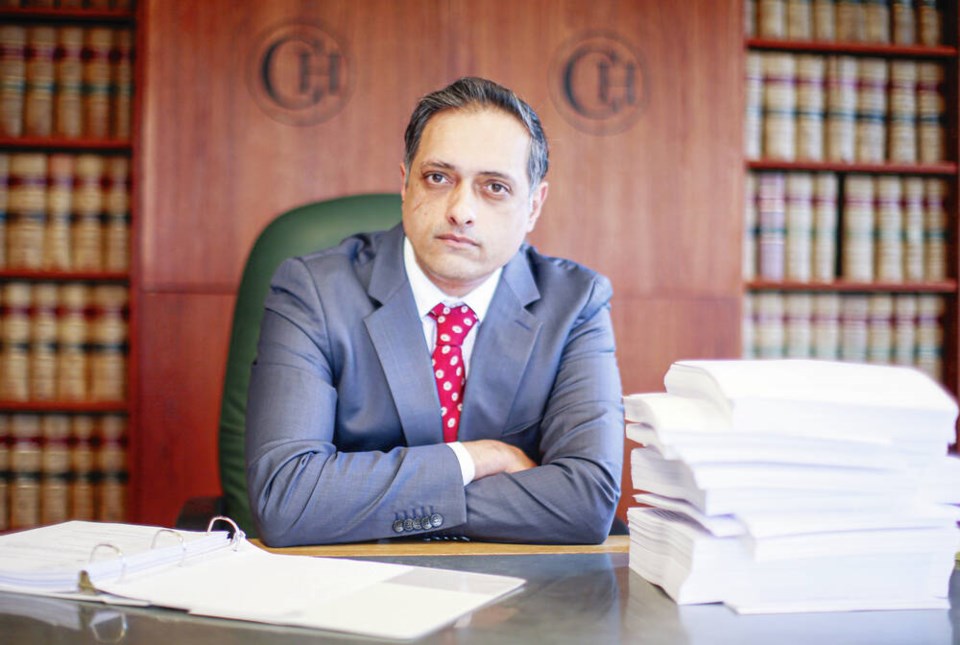Just over 200 union members are set to go up against their unions in a bid to prove that they failed to represent them or colluded with the government on COVID‑19 vaccine mandates.
Two doses of vaccination against COVID-19 was made a condition of employment for sa���ʴ�ý public service employees in November. People who wouldn’t get vaccinated or wouldn’t disclose their vaccination status were put on unpaid leave.
Lawyer Umar Sheikh of Sheikh Law will make the arguments before a Labour Relations Board hearing. A former Health Ministry director of labour relations, Sheikh led a successful fight against “vaccinate or mask” flu vaccine policies in 2019 as CEO of the British Columbia Nurses’ Union.
“It’s a pretty big labour board case,” Sheikh said. “I’ve dealt with massive union issues and I understand where the unions, in my view, have fallen down here.”
Sheikh will argue failure to represent and collusion under section 12 of the sa���ʴ�ý Labour Relations Code in a hearing on behalf of members belonging to several unions, including the sa���ʴ�ý General Employees’ Union, MoveUP, Unifor, CUPE 873, and the International Brotherhood of Electrical Workers. They include sa���ʴ�ý Transit workers and paramedics, among others.
The sa���ʴ�ý Labour Relations Board will be asked to find that the unions failed to represent members and as such award full damages and compensation, including income loss. Sheikh will argue the cases against each union individually, starting with the BCGEU and then proceeding to the national unions. “These will be huge,” he said.
Unions have said they are committed to helping members with legitimate medical or religious exemptions and while they didn’t want to see termination of members, the large majority of their members are in support of the vaccinations.
Union leaders have also cited the Order in Council that made vaccination a condition of employment for public service employees. It was ordered Nov. 19 and was retroactive to Nov 1. It’s a regulation under the Public Service Act.
The Order in Council, however, serves to underscore Sheikh’s argument: “It’s not possible to have done this without consultation with the unions, which means that the unions would have agreed for a certain segment of their members to be discriminated against,” he said. “And so we’re bringing a claim against them.”
The sa���ʴ�ý Public Service Employees for Freedom, a group formed late last year in response to the public service vaccine mandate, cited an unnamed sa���ʴ�ý Corrections worker in the south-central Interior as saying the BCGEU had “abandoned” them and “sided with the NDP government on this vaccine mandate.”
The sa���ʴ�ý Public Service Agency said that as of April 20,
402 employees were either unvaccinated or refused to disclose their vaccination status as required under the COVID-19 vaccination policy and 31 terminations had taken place.
Meanwhile, there are two streams of vaccine mandate cases headed to sa���ʴ�ý Supreme Court: non-union members of Crown corporations making a “policy argument” against mandatory vaccination, and a group of public servants serving as petitioners making a judicial review Charter of Rights argument.
Non-union workers at Crown corporations including sa���ʴ�ý Hydro, sa���ʴ�ý Lottery Corp and sa���ʴ�ý Transit will file individual lawsuits against their employers claiming constructive dismissal and wrongful termination.
These employees were placed on unpaid leave and unable to access employment insurance with no redress, Sheikh said. “These people are literally bankrupt,” he said, adding that one of his sa���ʴ�ý Transit clients died by suicide.
In a separate lawsuit, 11 sa���ʴ�ý public servants will go to sa���ʴ�ý Supreme Court as part of a petition to fight the vaccine mandate, save their jobs and be compensated for their losses.
Court documents say the vaccine policy fundamentally altered the employees’ contract “without proper notice or agreement or their consent, in order to terminate them without any sort of due process or procedural fairness, for just cause.”
As well, employees can only request an exemption from the vaccine requirement based on a medical condition or other protected ground as defined under B.C’s Human Rights Code.
No exemption was provided, however, for freedom of conscience or security of the person under the Charter of Rights and Freedoms, say court documents.
Additionally, Sheikh will argue the reasons for the two-dose vaccine mandate — to prevent transmission— no longer hold up as three doses is now the norm. Even vaccinated people can transmit COVID-19, and the mask and sa���ʴ�ý vaccine card mandates have been largely dropped.
The petitioners lost their bid in court for an injunction to hold off their firings until their case is heard in court in July. The petitioners were informed on April 14 that the terminations under the “Human Resources Policy 25 — COVID vaccination” could go ahead with 14 days’ notice.
The court filing says the vaccine mandate should be quashed. The mandate is expected to be in place until “public health concerns regarding COVID are reduced to a level, prescribed by government, to enable workplaces to operate without COVID-related restrictions.”

